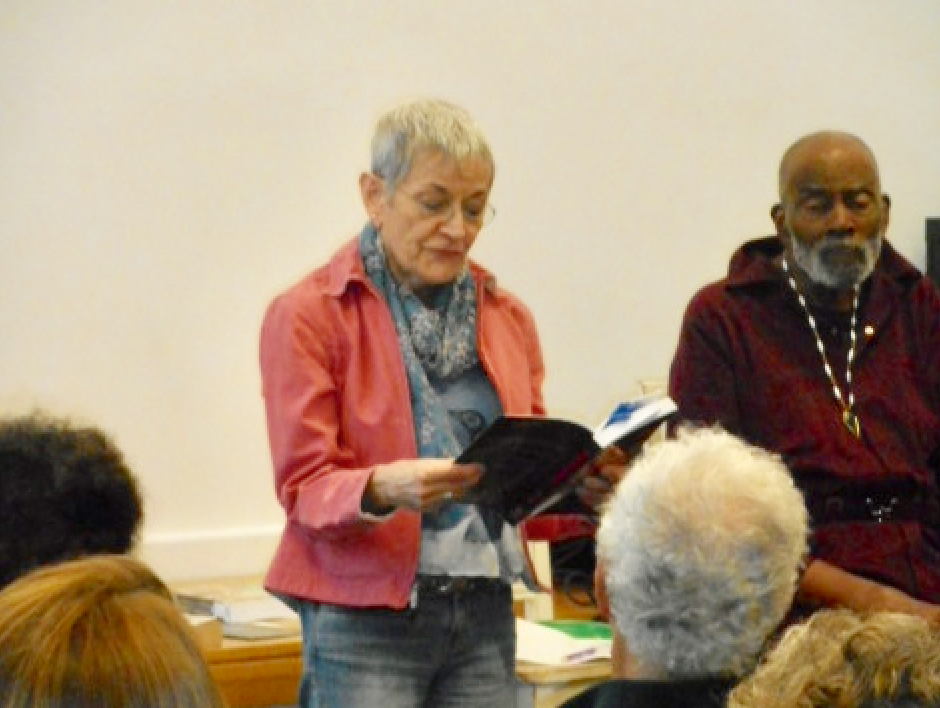The tall, almost 90-year-old man, his posture somewhat stooped but his gaze direct and observant, entered the library's community room with his wife and daughter, positioned himself on a high chair facing the overflow audience, and told the hosts he was ready to go. "Let everyone introduce themselves first," he insisted, and so they all did. Saying their names, where they lived in the South End and how long they'd been there, some of the old-timers received appreciative murmurs while the recent arrivals (40 years or less) were told amid hilarity they still had a long way to go before acquiring local legitimacy. No one had been in the South End as long as the star of the show, Mel King, who had been born in its New York Streets neighborhood in 1928.
State Rep. Byron Rushing introducing Mel King, whose legislative seat representing part of the South End he took over in 1982
"So Mel King wins again," commented State Rep. Byron Rushing, barely suppressing his trademark radiant smile. Rushing had come to introduce his friend, who preceded him as representative of the 9th Suffolk District at the State House until 1983. "What you have just witnessed is that Mel is fundamentally a community organizer. He is that young and vibrant." Rushing described how, when King was born, the city of Boston's 700,000 residents included only some 20,000 African Americans. All of that changed after the war, and King was part of that change. "He insisted all along that everyone coming and leaving were people in a time when huge numbers of people did not believe that," Rushing commented.
An audience member who agreed to read from King's Chain of Change.
King, for his turn, said that it was always important to know "who's in the room or in the community." In his time, there were three different racial groups, including those from Barbados and Portugal. In his school days, students would come home for lunch, and return for class in the afternoon. "Families of my school mates would say, 'you're so skinny, did you eat yet?'" and he would have a second meal, or a third. "In my very diverse neighborhood, I became acquainted with a wide range of foods from Europe, Asia and the Middle East," he recalled.
Mel King, signing copies of his book
Prevalent racial injustice and social neglect was met by different groups organizing around various unmet needs, including creating task forces for integrated church services, trash pickup and street repair. Northeastern University, which was segregated at the time, declined to admit King, despite strong grades. "They did me a huge favor," King told the library audience defiantly. "I went to Claflin College in Orangeburg, SC, where I learned to organize the community and do volunteer teaching in local schools." A Boston coach had promised King's mother he'd protect him after King's brother had pointed out that his "mouth was too big to go down South." King graduated with a degree in mathematics and returned to Boston where, among many other stellar achievements he successfully confronted the BRA's efforts to raze what was labeled "slums" and replace them with expensive housing, disregarding tenants' rights.
Pamela King and her father, Mel, with FOSEL host, Marleen Nienhuis
King was the director of the New Urban League of Greater Boston at the time, and retorted that the word 'slum' was inaccurate. In his opinion, these were neighborhoods where people lived, in their homes. "The word 'slums' delegitimized neighborhoods so the government could give it to the developers," he said. "We decided that what had happened in the West End of Boston was not going to happen in the South End. We were going to make sure that any displaced residents would get first dips in the new housing that would be built." That is what happened in the new housing complex that was built then, Tent City, near Copley Place, where a mix of lower, middle and upper-income housing has helped preserve economic diversity in the South End.
King, who represented the South End for almost a decade in the State Legislature, was adjunct professor of Urban Studies and Planning at MIT until 1996, and ran for mayor of Boston in 1983. Despite an enormous plurality among the African American and other ethnic voters, he lost to Ray Flynn. The author of Chain of Change, which focused on development in housing, education, employment and politics in Boston from the 1950s through the 1970s, King helped found community programs and institutions for low-income people in Boston and is the founder and current director of the South End Technology Center. Chain of Change was recently re-issued with the assistance of a grant from Eastern Bank.






